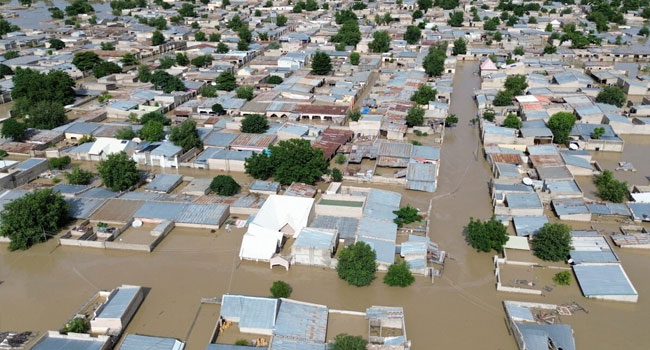The UN Development Programme, Global Environment Facility, Small Grants Programme (UNDP GEF SGP) has called on communities to raise awareness, take proactive measures, and prevent flood-related disasters.
The National Coordinator of the UNDP GEF SGP, Mrs Ibironke Olubamise made this appeal during an interview in Abuja on Sunday.
“I urge communities to remain vigilant, drawing lessons from past experiences, and not to underestimate the devastating impact of flooding.
“We must improve our strategies and develop clear evacuation plans, including identifying alternative routes for movement,” she added.
Olubamise emphasised that the National Emergency Management Agency (NEMA) could support communities by providing first aid kits in anticipation of potential flooding, rather than waiting until disaster strikes.
“NEMA can also explore traditional knowledge and practices that communities have historically used to prepare for and manage heavy rainfall.
“Relevant agencies should incorporate such indigenous practices to ensure that accurate, timely, and adequate information is disseminated to communities,” she advised.
According to her, this would also help reduce the pressure on emergency response efforts should flooding occur.
“It is essential to enforce compliance with safety guidelines within communities to ensure people adhere to early warnings and advice provided by authorities.
“There are proven communal strategies that have worked in the past. Communities should raise awareness among themselves to enhance their preparedness and understanding of flood risks.
“Stockpiling food in secure locations could be useful in the event that floods disrupt livelihoods, particularly farming and access to markets.
“To stay informed, communities should listen regularly to the radio for updates from relevant authorities, and follow all advice given to ensure the safety of lives and property,” she added.
Olubamise also urged communities to be mindful of the potential risks in the aftermath of flooding.
“There are significant health concerns, such as waterborne diseases, especially when clean water sources are contaminated,” she warned.
She reflected on recent global events, noting, “The world was shaken by another natural disaster on April 23 when a magnitude 6.2 earthquake struck parts of Bulgaria, Türkiye, Greece, and Romania.
“This incident made me reflect on how relatively fortunate Nigeria is in being spared from certain natural disasters,” she said.
Olubamise acknowledged that while some countries have developed strong systems and infrastructure to respond swiftly to such disasters, Nigeria still has room for improvement.
“Although Nigeria has made progress through the establishment of NEMA and, in some cases, state-level emergency agencies, their efforts are often insufficient for various reasons.
“Therefore, it is vital to explore alternative approaches to address these gaps.
“I believe that widespread awareness campaigns and empowering local communities are essential in managing natural disasters, many of which can be mitigated if the right structures are in place.
“Each year, rainfall leads to flooding across several states, disrupting movement, livelihoods such as farming, food supplies, and, tragically, resulting in loss of life,” she stated.
Olubamise urged Nigerians to ensure that the rainy season remains a blessing, rather than a source of chaos, destruction, and sorrow.
“I call on the Nigerian Meteorological Agency and NEMA to intensify their efforts by engaging in broad awareness campaigns to keep citizens informed about weather forecasts and early warnings,” she said.
NAN


